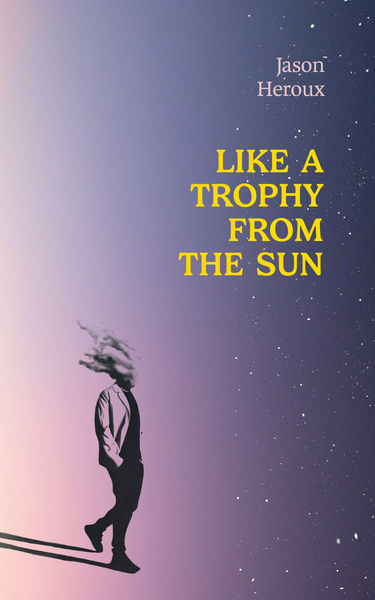Jason Heroux Explores the Joy and Bafflement of Our MIxed-Up World with Like a Trophy From the Sun
Jason Heroux is a prolific poet with a number of works published, and a collection of short fiction and various new chapbooks forthcoming. So, it's no surprise that the author believes that the writing life is something that cannot be hurried. But rather, that it is an ongoing search for the beautiful and true in the work of other poets, and a cumulative effort to keep your pen active and at the ready throughout your career.
His latest collection, Like a Trophy From the Sun (Guernica Editions), is a series of prose poems that further adds to his unique catalogue, and his journey as a poet. The untitled poems in the book bring together the seemingly mundane and unexpected, surreal dreamscapes. Humour, nostalgia, and haunting tableaus abound in these lines, all speaking to "the joy and bafflement of living in our bewildered mixed-up world."
Check out this fascinating Line and Lyric interview with the author, where he delves further into the inspiration for his work, the things that he has learned as a seasoned poet, and the process of bringing this collection together.
Open Book:
Tell us about this collection and how it came to be.
Jason Heroux:
Like a Trophy from the Sun is a book of untitled prose poems. There’s no overt theme to the book, other than the marvellous strangeness of the everyday and the dreamy magic of being here. One piece is about awakening inside your own pocket. Another describes the discovery of a village of tiny doors hiding inside someone’s heart. Prose poetry felt like the perfect way to capture that daily wonder. I’ve always been interested in prose poetry. The way it reduces poetry to its bare essentials, no lines breaks, no rhyming patterns, no formal structure. Each of my previous poetry collections contain a handful of prose poems. I began to wonder what it might be like to write a full collection of them. Around this time, I was introduced to a Norwegian writer named Dag T. Straumsvåg and we struck up a wonderful correspondence through email, discussing our favourite prose poets and their books, and the art of prose poetry as well. It was really through those conversations that the collection came into being. I wrote about three prose poems a week for a couple of years, and the ones that survived became the book.
OB:
Did you write poems individually and begin assembling this collection from stand-alone pieces, or did you write with a view to putting together a collection from the beginning?
JH:
I wrote this book with a view to putting together a collection from the beginning. My usual compositional method is to write poems individually and then assemble the stand-alone pieces - I generally begin with the ingredients, but the overall recipe remains a distant mystery and seeing how all the disparate pieces eventually connect becomes part of the journey. But with this book I knew from the start that it was going to be a collection of prose poems. Approaching the manuscript this way provided me with a sense of freedom and abandon. If an individual poem didn’t work, I wrote another. Raindrop by raindrop, the book’s puddle was built … removing one raindrop, adding another. It was very liberating.
OB:
What's more important in your opinion: the way a poem opens or the way it ends?
JH:
I love the way a poem opens. It’s like a miniature big bang, all that compressed energy exploding in every direction all at once. It opens a door that wasn’t there before. Lately for some reason I’ve been intrigued by the idea that after a poem starts, all it wants to do is end, and the poet is a kind of caretaker, attending to the poem’s needs as it approaches its final moment. On the other hand I wonder: do poems ever actually end? In workshops I often advise emerging poets, and myself, to be wary of ending a poem with a punchline or an epiphany. Sometimes those heavy endings feel like a performer taking a bow, signalling the show is over. Why not keep the door open? The best poems don’t end, but simply run out of words. They leap into the mind of the reader and continue growing there, traveling to all sorts of interesting destinations.
Your CanLit News
Subscribe to Open Book’s newsletter to get local book events, literary content, writing tips, and more in your inbox
OB:
What were you reading while writing this collection?
JH:
I was mostly reading prose poem collections, revisiting books that were on my bookshelf, and discovering plenty of new books as well. Short Talks by Anne Carson. The Book of Smaller by rob mclennan. The Last White House at the End of the Row of White Houses by Michael Casteels. James Tate. Russell Edson. Howie Good. Mary Ruelfe. The book I re-read the most was Charles Simic’s The World Doesn’t End, studying how many words, lines, and sentences each piece contained. Another book I studied closely was The Lure-Maker From Posio by Dag T. Straumsvåg. A wonderful book translated into English by Robert Hedin and Louis Jenkins, which invited me return to a Louis Jenkins collection on my shelf, Nice Fish: New and Selected Prose Poems. Many of the books I read during this time felt deeply connected to each other. For example, when I returned to the prose poems in Tom Hennen’s Darkness Sticks to Everything I spotted Dag’s name mentioned in the acknowledgements. I also dove deep into Eve Joseph’s Quarrels. So much so that I wrote her an email to share how much her book meant to me. She responded graciously and recommended I read the wonderful Danish poet Carsten René Nielsen, and also recommended his translator David Keplinger. After I read The Prayers of Others by David Keplinger somehow everything fell into place. I saw a way to blend all these literary influences into my own personal vision. That book really crystallized things for me.
OB:
Who did you dedicate the collection to and why?
JH:
I dedicated the book to Dag T. Straumsvåg, a wonderful prose poet who lives in Trondheim, Norway. Our mutual friend, Stuart Ross, introduced us by email years ago, and we’ve been growing our friendship, through correspondence, ever since. He’s become a dear friend.
As I mentioned earlier, the exchanges with Dag really helped shape the book. I showed him many poems in early drafts, and his encouragement and feedback was indispensable. He is such a master craftsman when it comes to prose poetry, and studying his work and having a chance to talk to him about his process and technique was such a gift. The exciting thing is that we both ended up working on manuscripts during this time. My manuscript turned into Like a Trophy from the Sun and the Dag’s manuscript is the forthcoming The Mountains of Kong: New and Selected Prose Poems (Assembly Press, May 2025). A book I highly recommended for any prose poetry lovers out there.
OB:
What advice would you give to an emerging or aspiring poet?
JH:
My advice to emerging or aspiring poets usually consist of the following five nuggets of wisdom:
Build a support network. Writing isn’t a race. The road never ends, and like the proven states: “If you want to go fast, go alone; but if you want to go far, go together.”
Aim low - you’ll be pleasantly surprised! Low expectations can yield unexpected delights. Try to get rejected as often as you can. Along the way, a few surprising acceptances will appear and lead to more rewarding opportunities.
Write whatever you want. Follow what compels you.
Have fun. Writing can be hard, challenging, and lonely. But it can also be a lot of fun. And if it’s not fun, then why do it?
Write 100 words a day. It doesn’t matter what you write, or when, but if you can write 100 words a day good things will happen.
OB:
What are you working on next?
JH:
I feel lucky to have two projects on the go at the moment, both of them related to prose poetry. First of all, my interactions with Dag led to us to work on a collaborative prose poem manuscript titled A Further Introduction to Bingo. It’s appearing later this year with above/ground press. I’ve also recently completed a manuscript titled My Life as a Notebook. It’s a series of prose poems from the perspective of a notebook. Eventually purchased by a poet, the notebook is misplaced, discovered, and abandoned again and again by a series of strangers, who each scribble their own entries in its pages. Along the way, the notebook goes through its own existential crisis, wondering: who am I, and what’s my purpose in the world? At the end of its many adventures, left behind in the lost and found drawer of a coffee shop, the notebook reflects on its life’s journey, and prepares for its own final moment while approaching its last words.
_________________________________________________
Jason Heroux was the Poet Laureate for the City of Kingston from 2019 to 2022. He is the author of four books of poetry: Memoirs of an Alias (2004); Emergency Hallelujah (2008); Natural Capital (2012) and Hard Work Cheering Up Sad Machines (2016). His forthcoming books include a short fiction collection Survivors of the Hive (Radiant Press) and two poetry chapbooks: New and Selected Days (Origami Poems Project) and Something or Other (above/ground press).







